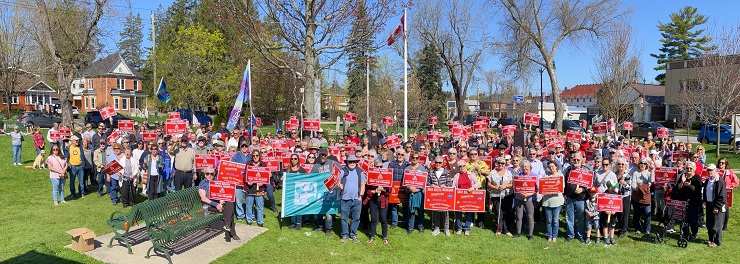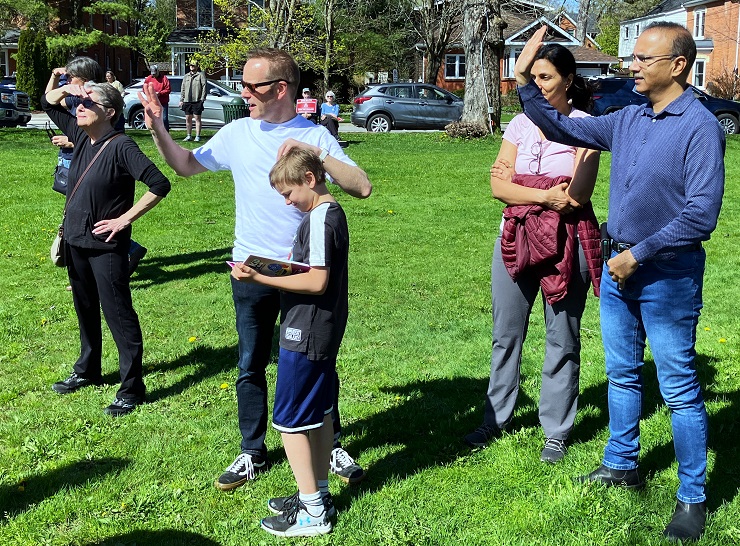DOCTORS, MAHC GIVE DIFFERING ACCOUNTS OF FACE-OFF; MORE PUBLIC MEETINGS JUNE 10-22 ACROSS MUSKOKA
Mark Clairmont | MuskokaTODAY.com
MUSKOKA — “It was the best of times, it was the worst of times, it was the age of wisdom, it was the age of foolishness, it was the epoch of belief, it was the epoch of incredulity, ….”
Paragraph 1, line one of “Tale of Two Cities.”
Charles Dickens could have been writing about the debacle of Muskoka hospitals, as doctors at odds with MAHC continue to have grave concerns after the latest online meeting and fear the worse for south Muskoka.
Dr. Rohit Gupta yesterday called the talks “dismal.”
MAHC also announced today that more public sessions are scheduled for June 10-22 and will take place at various locations throughout Muskoka, “providing another opportunity for community input. Details and registration information will be announced shortly.”
Today in a letter response to Wednesday’s virtual face-off with Muskoka Algonquin Healthcare’s board of directors, physicians predict dire health and safety consequences if redevelopment proceeds as planned.
“We foresee the eventual closure of the Emergency Department, Intensive Care Unit, and Acute Care Services at the Bracebridge site. When the inevitable staffing and financial pressures come, priority will be given to the larger acute care location in Huntsville and the capacity for care in South Muskoka will deteriorate,” they write.
“The Redevelopment Team of MAHC has indicated there will be no further engagement with physicians regarding the proposed model.
“The communities in South Muskoka should reject this proposed model for hospital redevelopment. There must be more acute care beds for south Muskoka to ensure the ongoing sustainability of our hospital, and to guarantee that patients in Muskoka will always receive care close to home.
“It is now up to the communities of South Muskoka to advocate for the care they deserve and want to see for their future. We encourage those interested in advocating to reach out to the current advocacy groups including “Save South Muskoka Hospital (SSMH)”, “Community Advocates for Hospitals and Healthcare for Muskoka and Area (CAHHMA)”, and “South Muskoka Matters.”
* See below the list of the 43 south Muskoka physicians who signed today’s letter. **And their references.

MAHC took another tack in its meeting response release, claiming it “continues to make strides in the redevelopment and expansion of healthcare in the Muskoka region. These efforts are supported by ongoing discussions with physicians and extensive stakeholder feedback, focusing on enhancing healthcare delivery across our communities.
“In recent engagements, MAHC has noted a positive direction in gaining endorsement from Muskoka physicians regarding the dual-site healthcare system. Though there are some South Muskoka physicians who remain opposed to the plan, this design includes full-service capabilities at both the Bracebridge and Huntsville sites and has been crafted to provide comprehensive healthcare services region-wide.”
See more on their release below.
The arguments against and for …
The ‘Letter from (43) Physicians of South Muskoka to the South Muskoka Community Regarding the Future of South Muskoka Memorial Hospital’ reads:
“We are writing this letter to update the community on the meeting between the Capital Redevelopment Team of MAHC and the physicians of MAHC that took place on May 8.
“Despite significant concerns voiced by the physicians of South Muskoka, the Capital Redevelopment Team has made it clear that there will be no further change to their current plan.”
Doctors outlined MAHC’s original offering at the south Muskoka model as “cutting the size from the current 59 acute care beds, 5 ICU beds and 2 obstetrics beds to only 18 acute care beds with no ICU or obstetrical beds. After advocacy from the community and physicians of South Muskoka, the model was modified to now have 36 acute care beds which include 4 ICU beds and 1 obstetrical bed.”
However, they say: “While these are important improvements, this is still a reduction of approximately 40 per cent in the number of acute care beds compared to the current capacity. Importantly, this is for a population that grew by 8 per cent in 2021 (thttps://www.simcoemuskokahealth.org/Health-Stats/HealthStatsHome/PopulationDemographics/Population).
“Given that the current number of beds at South Muskoka Memorial Hospital (SMMH) is even now struggling to meet the acute care needs of south Muskoka, we cannot understand how a reduction of beds by 40 per cent will be able to meet the acute care needs of south Muskoka in the years to come.
“In contrast, there will be a significant increase in the number of acute care beds at the Huntsville site, increasing from the current 46 up to 82 beds (78 per cent increase). Many patients in south Muskoka requiring acute medical care and admission to hospital will therefore need to be transferred to Huntsville.

Doctors’ main concerns:
“As physicians who live and work in south Muskoka, we continue to be opposed to the model developed by the Capital Redevelopment Team. Our main concerns are as follows:
Increased risk for adverse outcomes inherent in interhospital transfer. In this model, many acute care patients will still need to be transferred from South Muskoka to Huntsville.
“The sickest patients are at highest risk for adverse outcomes in transfer (see references for evidence) and with the reduction in south Muskoka ICU beds, critically ill patients will have to be transferred to the larger ICU in Huntsville.
“Notably, while there have been claims that Huntsville needs 10 ICU beds to establish a level 3 ICU, this has been confirmed to be false.
“Moreover, patients from South Muskoka who are transferred to Huntsville are being transported further away from definitive care for their conditions. For example, patients admitted with heart attacks often need to be transferred to Barrie for coronary angiogram, and patients with a major type of stroke must travel to Toronto for a procedure called endovascular thrombectomy (EVT). Patients who need these procedures will be unnecessarily transferred north to only have to go back down south for definitive treatment. This is not economical nor in the best interest of patient care.
Deterioration of primary care services and loss of continuity of care
“Many family doctors in South Muskoka provide acute care services to their patients while in hospital. Understanding the medical and social context of their patients helps family doctors optimize inpatient care and outpatient follow up. Transferring patients away from south Muskoka means that patients will be managed by a physician who is not familiar with the patient.
“Further, many family doctors come to south Muskoka because of their interest in acute care medicine, which will be drastically diminished under this model. This will make south Muskoka less attractive for family doctors who wish to practice comprehensive care.

Inability to meet the needs of the future population, especially seniors
“Our hospital currently operates over capacity on a regular basis. The population in South Muskoka is growing and aging, and it is only rational to expect that the healthcare needs of our community will be drastically increasing over the coming years. Reducing the number of beds at the Bracebridge site by 40% will mean that we will not be able to care for the acute care needs of our community.
Future physician recruitment
“Under this proposed model, it will be natural for physicians to gravitate towards the larger regional site as a base for their practice. This will mean that physician recruitment in South Muskoka will be challenging.
“Further, a main source of physician recruitment is through our training program for medical students and residents. In this proposed model, we predict that medical trainees would base the majority of their training at the larger acute care hospital in Huntsville. This will negatively impact our ability to recruit and retain physicians, meaning that the citizens in south Muskoka will need to travel longer distances for even routine healthcare.
Long-term sustainability/destabilization of SMMH
“We are concerned for the long-term viability of the Bracebridge site in this model. As we have seen throughout Ontario (with recent examples being in Niagara, Huron-Perth, and Haliburton Highlands), smaller hospitals struggle to survive in regional models. Without sufficient acute care services, it will be very difficult to recruit and retain specialists and surgeons to the smaller site.
“This will leave primary and emergency care without robust specialist support, and this is why we are worried that acute care services in south Muskoka will eventually fail in this proposed system.

MAHC writes in its defence:
“From a Quality perspective, the revised model proposed for MAHC’s Capital Redevelopment plan achieves a number of improvements over its earlier versions,” said Dr. Caroline Correia, MAHC’s Quality Lead.
“It improves access to care, ensuring that across the region, access to core services including emergency, inpatient care, obstetrical care, surgical and anesthetic services, and critical care are readily available… I believe that this revised model meets the needs of our communities and responds appropriately to the feedback received to date from the credentialed staff.”
MAHC says Dr. Pierre Mikhail, a Huntsville ER doctor MAHC, reached out to their leadership following the Credentialed Staff Association meeting on Wednesday night to say: “Once again I wanted to thank you for your excellent work. I feel you listened to concerns, updated the plan to address the most important concerns and have given us ample opportunity to engage. The plan is imperfect, but it is also fantastic,” said Mikhail.
MAHC quoted Dr. Rich Trenholm, a sports medicine physician in Huntsville: “It is not fiscally or socially sustainable or responsible to have two rural hospitals in two neighbouring towns providing largely identical services. If our region wants to continue to have a robust healthcare system that is truly close to home, we need to be a collaborative organization that, between the two sites and related community programming, will work together to truly allow for more patients to be cared for ‘close to home.
“It excites me as a physician that we may be able to offer a more robust, innovative, and sustainable healthcare system than what we currently have.”
MAHC’s release continues.
“While enthusiasm is building, physicians have raised important considerations regarding the system’s long-term functionality, including aspects related to transportation, recruitment and retention, quality of care, and anticipated demographic changes.
“These functional aspects have been considered in the current iteration of the health system plan and MAHC is committed to ongoing transparency related to the further refinement of these details in the design. Continuous dialogue with medical staff and the broader healthcare community is essential and will extend well beyond the 1.3 plan submission to ensure that all aspects of the system’s functionality are thoroughly understood and effectively implemented.
“Recent feedback has already led to significant enhancements in regional healthcare services:
- Both sites will have full surgical capabilities and two operating rooms at each site, ensuring efficient and comprehensive surgical services for our patients.
- An Intensive Care Unit (ICU) will remain at the Bracebridge site, complimenting the Level 3 ICU planned for the Huntsville site, enhancing our capacity for comprehensive care.
- The proposed increase of inpatient beds at the Bracebridge site to 36 will reduce the necessity for patient transfers and meet the healthcare needs of the community.
- Obstetrics services continue at both hospital sites, supporting maternal and newborn care across Muskoka and area.
“As chief of staff, I am immensely proud of the collaborative efforts between our healthcare professionals and stakeholders in refining our healthcare system,” said Dr. Khaled Abdel-Razek. “We have listened closely to our physicians, staff, and other healthcare providers, and we have created a model that is innovative, integrated, and will provide high-quality sustainable healthcare.
“By continuing to work together, we can ensure that we not only meet the current needs of Muskoka and area residents, but we are also prepared to address future healthcare demands with resilience and effectiveness.”
The MAHC release said looking ahead, it is “dedicated to maintaining an open and transparent engagement process with all stakeholders. Continued consultation will take place with internal staff, community organizations, and the broader public June 10-22.
Said Cheryl Harrison, CEO of MAHC: “We are making significant strides toward enriching the quality of care within our organization by fostering collaboration among our physicians and healthcare professionals. Engaging in a collaborative approach is crucial for the advancement of our healthcare system, and we remain committed to actively involving physicians, staff, and the community in this endeavor. We encourage all stakeholders, including those who may oppose our current plan, to join us in this journey of continual learning and improvement.”
* The south Muskoka physician’ letter was endorsed by:
- Sandi Adamson, MD, MBA, CFPC
- Faizal Bawa, MD, CCFP
- Paulette Burns, MD, B.Sc. (Hons)
- William Caughey, MD, FRCP(C)
- Richard Daniel, MD, B.Sc., MB, CCFP
- Vicki Dechert, MD, COE
- Kimberley Forester, MD, CCFP
- Graeme Gair, MD, Past COS SMMH
- Rohit Gupta, MD, DNB, FRCSC
- Jennifer Hammell, MD, CCFP
- William Hemens, MD, M.Sc., CCFP
- Dave Hillyard, MD, CCFP
- Terry Holman, MD, CCFP
- Ken Hotson, MD, FCFP, B.Sc. (Med), BA, BSc
- Kristen Jones, MD, CCFP
- Tina Kappos, MD, B.Sc. (Hons), CCFP
- David Kent, MD, CCFP
- Kersti Kents, MD, CCFP (EM), PgDip (Derm)
- Florian Kirstein MD, CCFP
- Cole Krensky, MD, CCFP
- Christopher LaJeunesse, MD, DABFM, CCFP
- Shannon Lees, MD, B.Sc., M.Sc., CCFP
- Adam MacLennan, MD, CCFP
- Peter Maier, MD, CCFP, FCFP, AAFP
- Karen Martin, MD
- Michael Mason, MD, CCFP (EM)
- Timea Maxim, MD, CCFP, AAFP
- Bharti Mittal, MBBS, CCFP
- Keith Moran, MD, RCPSC, DABIM, RCS
- Jessica Nairn, MD, CCFP
- Martin O’Shaughnessy, MD
- Kent Phillips, MD, FCFP
- Jeff Pitcher, MD, CCFP
- Courtney Potts, MD, CCFP
- Jessica Reid, MD, M.Sc., FRCSC
- Jonathan Rhee, MD, FRCSC
- Chris Richardson, MD, CCFP (FPA)
- Steve Rix, MB.BS, MRCS(Ed), PgDip-SEM, CCFP
- Ardyn Todd, MD, CCFP
- Lisa Tsugios, MD, CCFP
- Andrew Wilson MD, FRCP(C)
- Scott Whynot, MD, M.Sc., (PT), CCFP
- Luke Wu, MD, M.Sc., FRCPC (IM)
** References referred to in doctors’ letter:
1 Schnipper et all. Interhospital Transfer: Transfer Processes and Patient Outcomes. Journal of Hospital Medicine, 2019.
2 Torner et al. Inter-hospital transfer is associated with increased mortality and costs in severe sepsis and septic shock: an instrumental variables approach. Journal of Critical Care, 2016.
3 Wen et al. Impact of interhospital transfer on emergency department timeliness of care and in-hospital outcomes of adult non-trauma patients. Heliyon, 2023.
4 Edye et al. Interhospital transfer delays emergency abdominal surgery and prolongs stay. Royal Australian College of Surgeons, 2016.
5 Reinke et al. Interhospital transfer for emergency general surgery: an independent predictor of mortality. The American Journal of Surgery, 2018.
EMAIL: news@muskokatoday.com
30 years of TRUSTED ‘Local Online Journalism’
Twitter: @muskokatoday, Facebook: mclairmont1
SUBSCRIBE for $25 by e-transferring to news@muskokatoday.com
Mail cheque to MuskokaTODAY.com Box 34 Gravenhurst, Ont. P1P 1T5
And include your email address to get stories sent to your inbox
